Burt A. The Evolution of the British Empire and Commonwealth From the American Revolution
Подождите немного. Документ загружается.

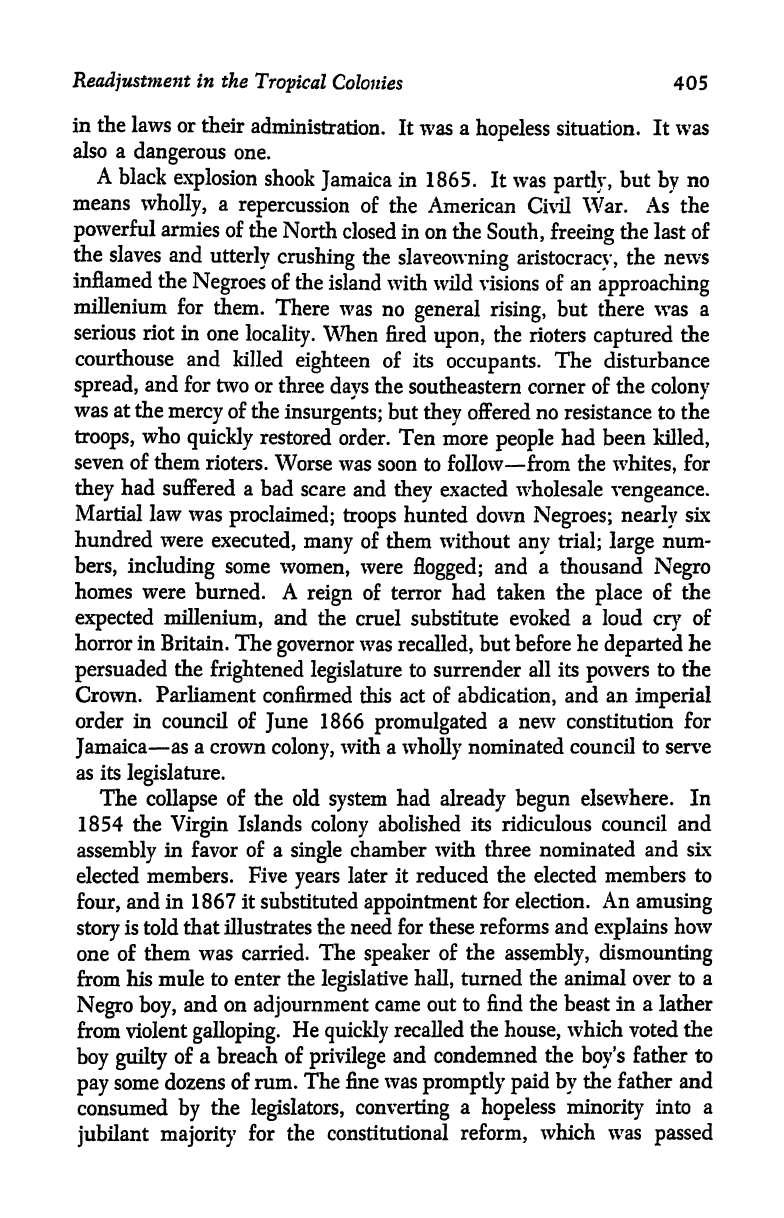
Readjustment
in
the
Tropical
Colonies
405
in
the laws
or
their
administration.
It
was
a
hopeless
situation.
It
was
also a
dangerous
one.
A
black
explosion
shook
Jamaica
in 1865.
It
was
partly,
but
by
no
means
wholly,
a
repercussion
of the American
Civil
War. As the
powerful
armies
of
the
North
closed in on the
South,
freeing
the
last
of
the
slaves
and
utterly
crushing
the
slaveowning
aristocracy,
the
news
inflamed
the
Negroes
of
the
island
with
wild visions
of
an
approaching
millenium
for
them.
There
was
no
general
rising,
but
there
was
a
serious
riot in
one
locality.
When
fired
upon,
the
rioters
captured
the
courthouse
and
killed
eighteen
of
its
occupants.
The disturbance
spread,
and
for two
or
three
days
the
southeastern
corner of the
colony
was
at the
mercy
of
the
insurgents;
but
they
offered
no
resistance
to
the
troops,
who
quickly
restored
order.
Ten
more
people
had
been
killed,
seven of them
rioters.
Worse
was soon
to follow
from
the
whites,
for
they
had
suffered
a
bad
scare
and
they
exacted
wholesale
vengeance.
Martial
law
was
proclaimed;
troops
hunted
down
Negroes;
nearly
six
hundred were
executed,
many
of
them
without
any
trial;
large
num-
bers,
including
some
women,
were
flogged;
and
a thousand
Negro
homes were
burned.
A
reign
of terror had
taken
the
place
of
the
expected
millenium,
and
the cruel substitute evoked
a
loud
cry
of
horror in Britain.
The
governor
was
recalled,
but
before
he
departed
he
persuaded
the
frightened
legislature
to surrender
all its
powers
to the
Crown. Parliament
confirmed
this
act
of
abdication,
and
an
imperial
order
in council
of
June
1866
promulgated
a
new constitution
for
Jamaica
as
a
crown
colony,
with a
wholly
nominated
council
to
serve
as
its
legislature.
The
collapse
of the
old
system
had
already begun
elsewhere.
In
1854 the
Virgin
Islands
colony
abolished its ridiculous
council and
assembly
in
favor
of
a
single
chamber
with three nominated
and
six
elected
members.
Five
years
later
it reduced the elected
members to
four,
and
in
1867
it substituted
appointment
for election.
An
amusing
story
is
told
that illustrates
the need for these
reforms
and
explains
how
one of
them was carried.
The
speaker
of
the
assembly,
dismounting
from
his mule
to
enter the
legislative
hall,
turned the
animal
over
to
a
Negro
boy,
and
on
adjournment
came
out
to find the
beast
in
a
lather
from
violent
galloping.
He
quickly
recalled the
house,
which voted
the
boy
guilty
of
a breach
of
privilege
and condemned
the
boy's
father
to
pay
some dozens
of
rum.
The fine
was
promptly paid
by
the father and
consumed
by
the
legislators,
converting
a
hopeless
minority
into
a
jubilant
majority
for
the
constitutional
reform,
which
was
passed
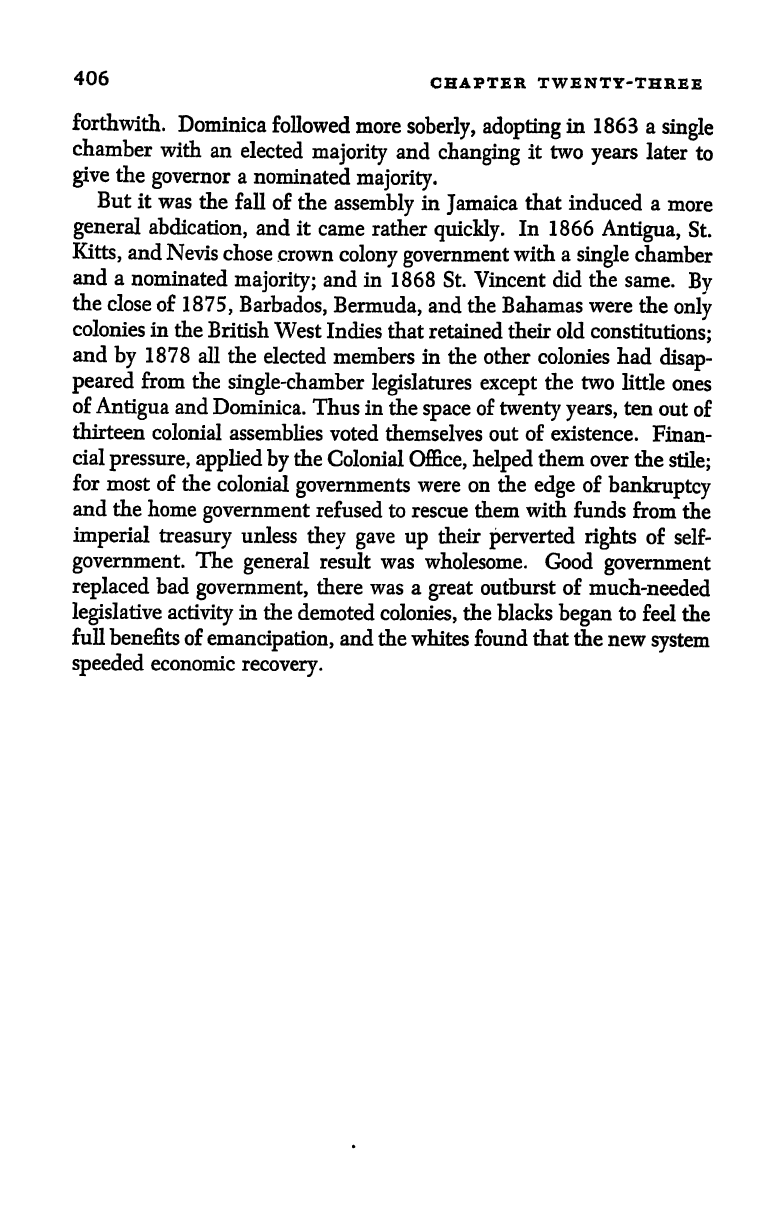
406
CHAPTER
TWENTY-THREE
forthwith.
Dominica
followed
more
soberly, adopting
in 1863
a
single
chamber
with
an
elected
majority
and
changing
it two
years
later
to
give
the
governor
a
nominated
majority.
But
it
was
the
fall
of the
assembly
in
Jamaica
that
induced a
more
general
abdication,
and
it
came
rather
quickly.
In 1866
Antigua,
St.
Kitts,
and
Nevis
chose
crown
colony
government
with a
single
chamber
and a
nominated
majority;
and
in
1868 St. Vincent
did
the
same.
By
the
close
of
1875,
Barbados,
Bermuda,
and
the Bahamas
were
the
only
colonies in
the
British
West
Indies
that
retained
their old
constitutions;
and
by
1878
all the
elected
members
in
the other colonies
had
disap-
peared
from
the
single-chamber
legislatures
except
the
two
little
ones
of
Antigua
and
Dominica.
Thus
in
the
space
of
twenty
years,
ten
out
of
thirteen
colonial
assemblies
voted
themselves out
of
existence.
Finan-
cial
pressure,
applied
by
the
Colonial
Office,
helped
them
over
the
stile;
for
most of
the
colonial
governments
were on die
edge
of
bankruptcy
and
the
home
government
refused to rescue them with
funds
from
the
imperial
treasury
unless
they
gave
up
their
perverted
rights
of
self-
government.
The
general
result was
wholesome. Good
government
replaced
bad
government,
there
was
a
great
outburst of
much-needed
legislative
activity
in
the
demoted
colonies,
the
blacks
began
to
feel
the
full
benefits
of
emancipation,
and
the
whites found
that
the
new
system
speeded
economic
recovery.
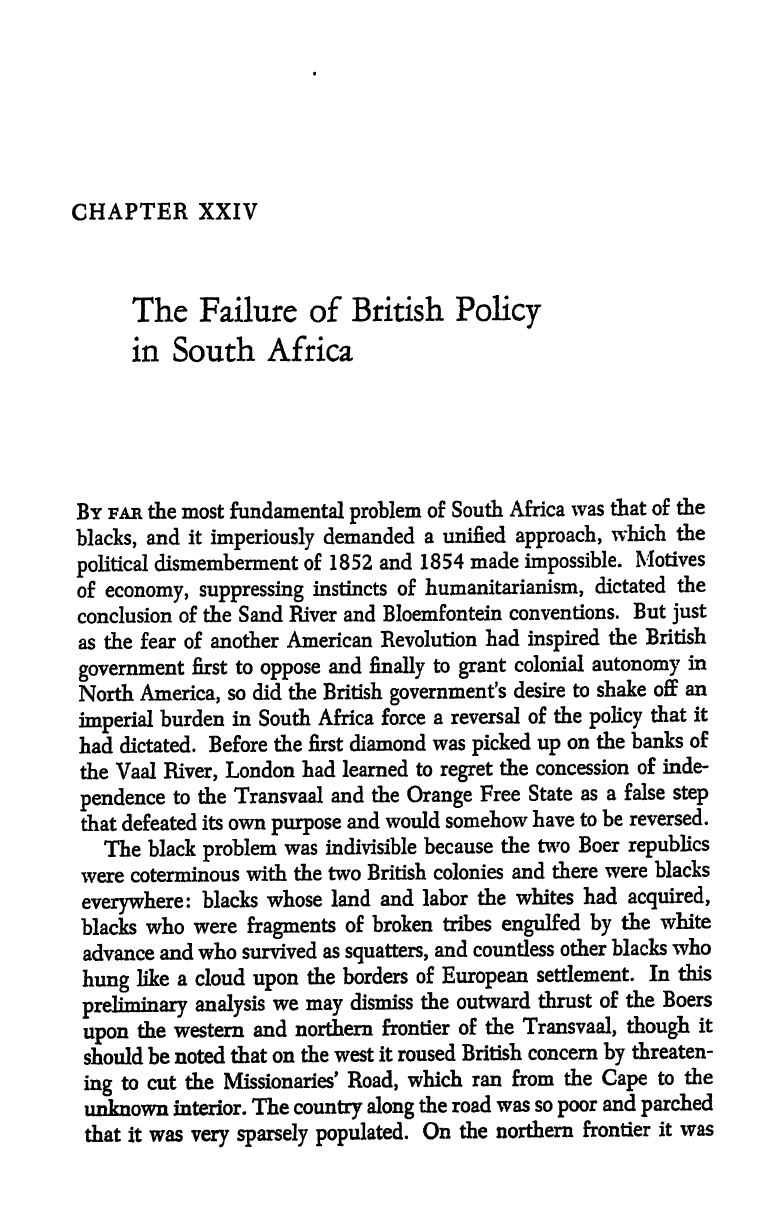
CHAPTER
XXIV
The
Failure of
British
Policy
in
South
Africa
BY
FAR the
most fundamental
problem
of
South
Africa
was
that
of
the
blacks,
and
it
imperiously
demanded
a
unified
approach,
which
the
political
dismemberment
of
1852
and
1854
made
impossible.
Motives
of
economy,
suppressing
instincts
of
humanitarianism,
dictated
the
conclusion
of
the
Sand
River and
Bloemfontein
conventions.
But
just
as
the
fear
of
another
American
Revolution
had
inspired
the
British
government
first
to
oppose
and
finally
to
grant
colonial
autonomy
in
North
America,
so
did
the British
government's
desire
to
shake
off
an
imperial
burden
in
South
Africa
force
a
reversal
of
the
policy
that
it
had
dictated.
Before
the
first diamond
was
picked
up
on
the
banks
of
the Vaal
River,
London
had
learned
to
regret
the concession
of
inde-
pendence
to
the
Transvaal
and
the
Orange
Free
State
as
a
false
step
that defeated
its own
purpose
and
would
somehow
have
to be
reversed.
The
black
problem
was
indivisible
because
the
two
Boer
republics
were
coterminous
with
the
two
British
colonies
and
there
were
blacks
everywhere:
blacks
whose
land
and
labor
the
whites
had
acquired,
blacks
who
were
fragments
of
broken
tribes
engulfed
by
the
white
advance
and
who
survived
as
squatters,
and countless
other
blacks
who
hung
like
a
cloud
upon
the
borders
of
European
settlement.
In
this
preliminary
analysis
we
may
dismiss
the
outward
thrust
of
the
Boers
upon
the
western
and
northern
frontier
of
the
Transvaal,
though
it
should
be
noted
that
on
the
west
it roused
British
concern
by
threaten-
ing
to
cut
the
Missionaries'
Road,
which
ran from
the
Cape
to
the
unknown
interior.
The
country
along
the
road
was so
poor
and
parched
that
it
was
very
sparsely
populated.
On
the
northern
frontier
it
was
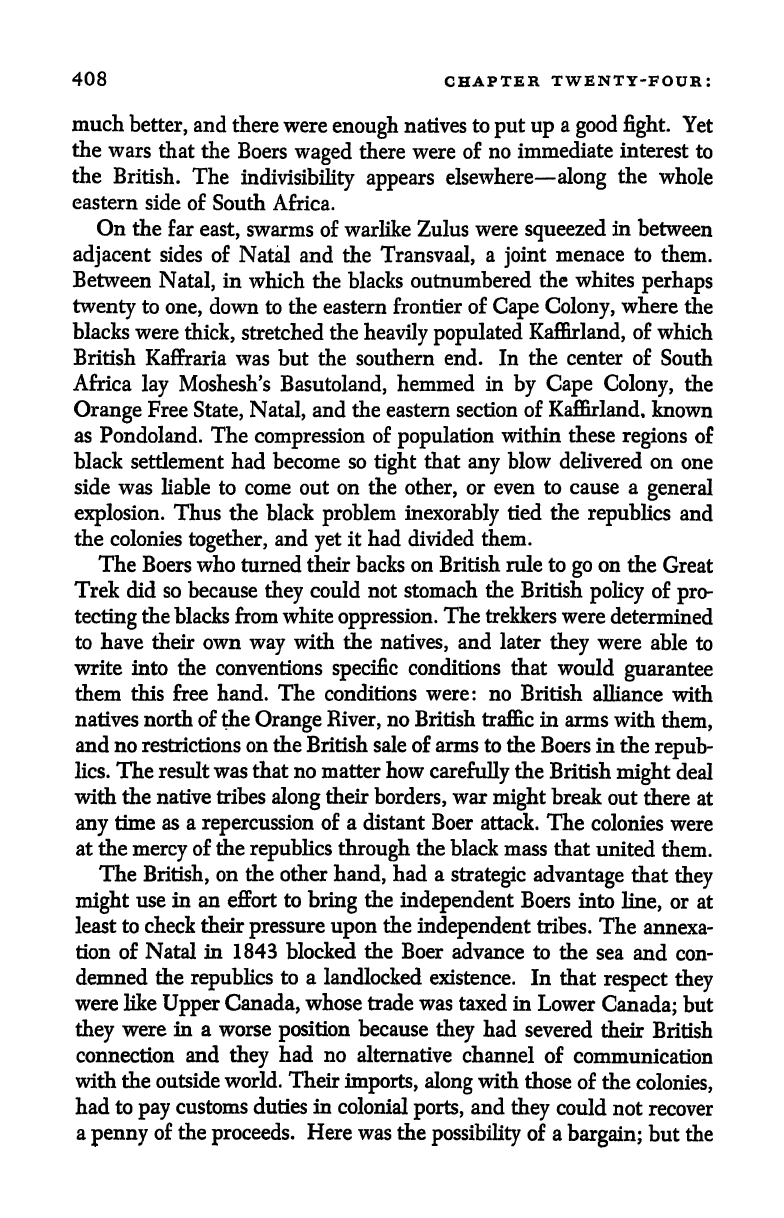
408
CHAPTER
TWENTY-FOUR:
much
better,
and
there were
enough
natives
to
put
up
a
good fight.
Yet
the
wars that
the
Boers
waged
there were of
no
immediate interest
to
the
British.
The
indivisibility appears
elsewhere
along
the
whole
eastern
side of
South
Africa.
On
the
far
east,
swarms of warlike
Zulus
were
squeezed
in
between
adjacent
sides
of
Natal and the
Transvaal,
a
joint
menace
to them.
Between
Natal,
in which the
blacks
outnumbered
the whites
perhaps
twenty
to
one,
down
to the
eastern frontier of
Cape
Colony,
where
the
blacks
were
thick,
stretched
the
heavily populated
Kaffirland,
of
which
British Kaffiraria
was
but
the
southern
end. In
the center of
South
Africa
lay
Moshesh's
Basutoland,
hemmed
in
by
Cape
Colony,
the
Orange
Free
State, Natal,
and
the eastern section
of
Kaffirland,
known
as
Pondoland.
The
compression
of
population
within these
regions
of
black
settlement
had become
so
tight
that
any
blow delivered
on
one
side
was
liable to come
out on
the
other,
or
even
to cause a
general
explosion.
Thus
the black
problem
inexorably
tied the
republics
and
the
colonies
together,
and
yet
it had divided
them.
The
Boers
who
turned
their
backs
on
British rule to
go
on
the
Great
Trek
did
so because
they
could
not stomach
the
British
policy
of
pro-
tecting
the blacks from
white
oppression.
The
trekkers
were
determined
to have their own
way
with the
natives,
and later
they
were
able
to
write
into
the
conventions
specific
conditions that
would
guarantee
them this
free
hand.
The
conditions
were: no
British
alliance
with
natives
north
of
the
Orange
River,
no
British
traffic in
arms
with
them,
and no restrictions
on the
British
sale
of arms to the
Boers in
the
repub-
lics. The result was
that
no matter
how
carefully
the British
might
deal
with
the native tribes
along
their
borders,
war
might
break
out
there
at
any
time as
a
repercussion
of a distant Boer
attack.
The
colonies
were
at the
mercy
of
the
republics
through
the black
mass that
united them.
The
British,
on
the
other
hand,
had
a
strategic
advantage
that
they
might
use in an effort to
bring
the
independent
Boers
into
line,
or at
least to check
their
pressure upon
the
independent
tribes.
The
annexa-
tion of Natal
in 1843
blocked
the Boer
advance
to
the
sea
and
con-
demned
the
republics
to a
landlocked
existence. In
that
respect
they
were like
Upper
Canada,
whose trade
was
taxed
in
Lower
Canada;
but
they
were in a worse
position
because
they
had
severed
their
British
connection and
they
had no
alternative
channel of
communication
with the
outside world.
Their
imports,
along
with
those
of
the
colonies,
had to
pay
customs duties
in
colonial
ports,
and
they
could
not
recover
a
penny
of the
proceeds.
Here was
the
possibility
of a
bargain;
but the
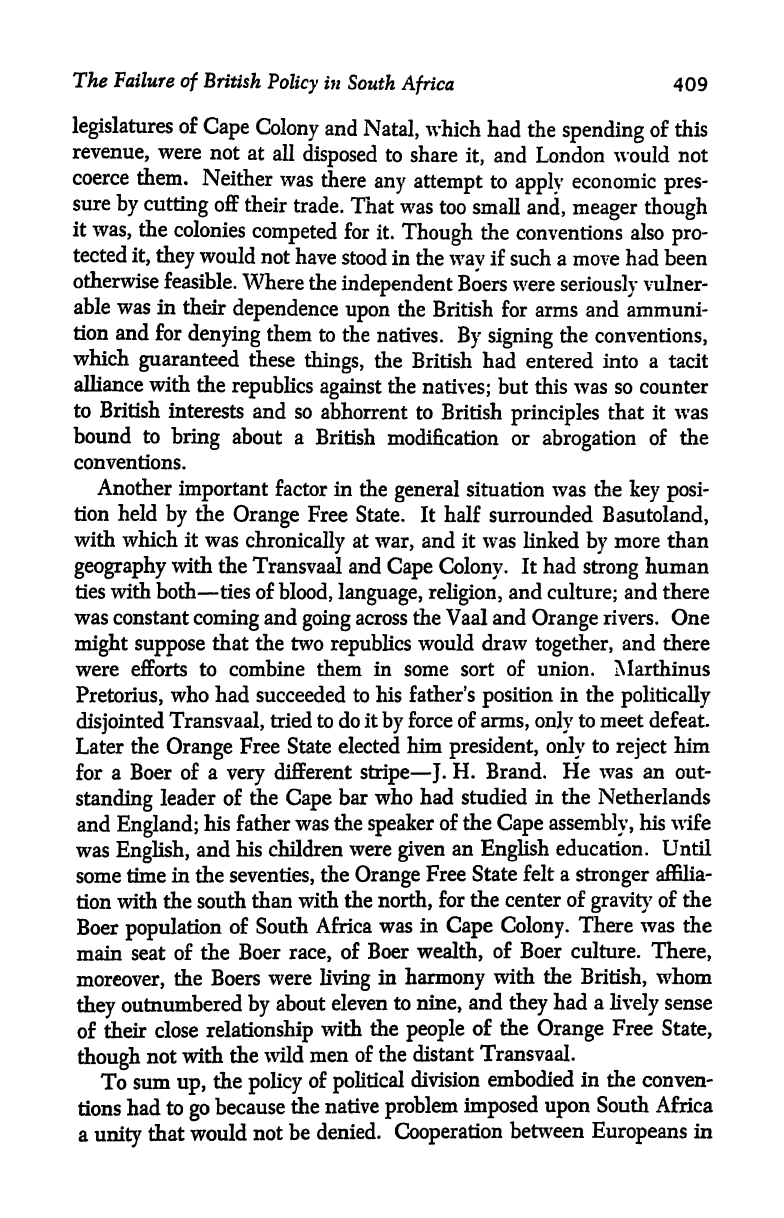
The Failure
of
British
Policy
in
South
Africa
409
legislatures
of
Cape
Colony
and
Natal,
which
had
the
spending
of
this
revenue,
were
not
at
all
disposed
to share
it,
and London would
not
coerce
them.
Neither
was
there
any attempt
to
apply
economic
pres-
sure
by
cutting
off
their
trade.
That
was
too small
and,
meager
though
it
was,
the
colonies
competed
for
it.
Though
the
conventions
also
pro-
tected
it,
they
would
not
have
stood
in
the
way
if
such a
move had
been
otherwise
feasible.
Where
the
independent
Boers
were
seriously
vulner-
able was in
their
dependence
upon
the British
for
arms and
ammuni-
tion
and
for
denying
them
to the
natives.
By
signing
the
conventions,
which
guaranteed
these
things,
the
British had
entered
into
a
tacit
alliance
with
the
republics
against
the
natives;
but this was so counter
to British
interests
and so
abhorrent
to British
principles
that it was
bound to
bring
about a
British
modification or
abrogation
of
the
conventions.
Another
important
factor in
the
general
situation was the
key
posi-
tion
held
by
the
Orange
Free State.
It half surrounded
Basutoland,
with
which it
was
chronically
at
war,
and it was linked
by
more
than
geography
with
the
Transvaal and
Cape
Colony.
It
had
strong
human
ties
with
both ties
of
blood,
language, religion,
and
culture;
and
there
was
constant
coming
and
going
across the Vaal
and
Orange
rivers.
One
might
suppose
that the
two
republics
would draw
together,
and there
were efforts to combine
them
in
some sort
of union. Marthinus
Pretorius,
who had succeeded to his
father's
position
in the
politically
disjointed
Transvaal,
tried
to
do
it
by
force of
arms,
only
to
meet
defeat.
Later
the
Orange
Free State elected
him
president, only
to
reject
him
for
a
Boer
of a
very
different
stripe
J.
H.
Brand.
He
was
an out-
standing
leader of
die
Cape
bar
who had
studied
in the
Netherlands
and
England;
his
father
was
the
speaker
of
the
Cape assembly,
his
wife
was
English,
and
his children
were
given
an
English
education.
Until
some
time
in
the
seventies,
the
Orange
Free State felt
a
stronger
affilia-
tion
with
the south
than
with the
north,
for
the center
of
gravity
of
the
Boer
population
of
South
Africa
was
in
Cape
Colony.
There was
the
main
seat
of
the
Boer
race,
of
Boer
wealth,
of Boer
culture.
There,
moreover,
the Boers
were
living
in
harmony
with the
British,
whom
they
outnumbered
by
about
eleven
to
nine,
and
they
had
a
lively
sense
of
their
close
relationship
with
the
people
of
the
Orange
Free
State,
though
not
with the
wild
men
of
the distant
Transvaal.
To
sum
up,
the
policy
of
political
division
embodied
in
the conven-
tions
had to
go
because
the
native
problem
imposed upon
South
Africa
a
unity
that
would
not
be
denied.
Cooperation
between
Europeans
in
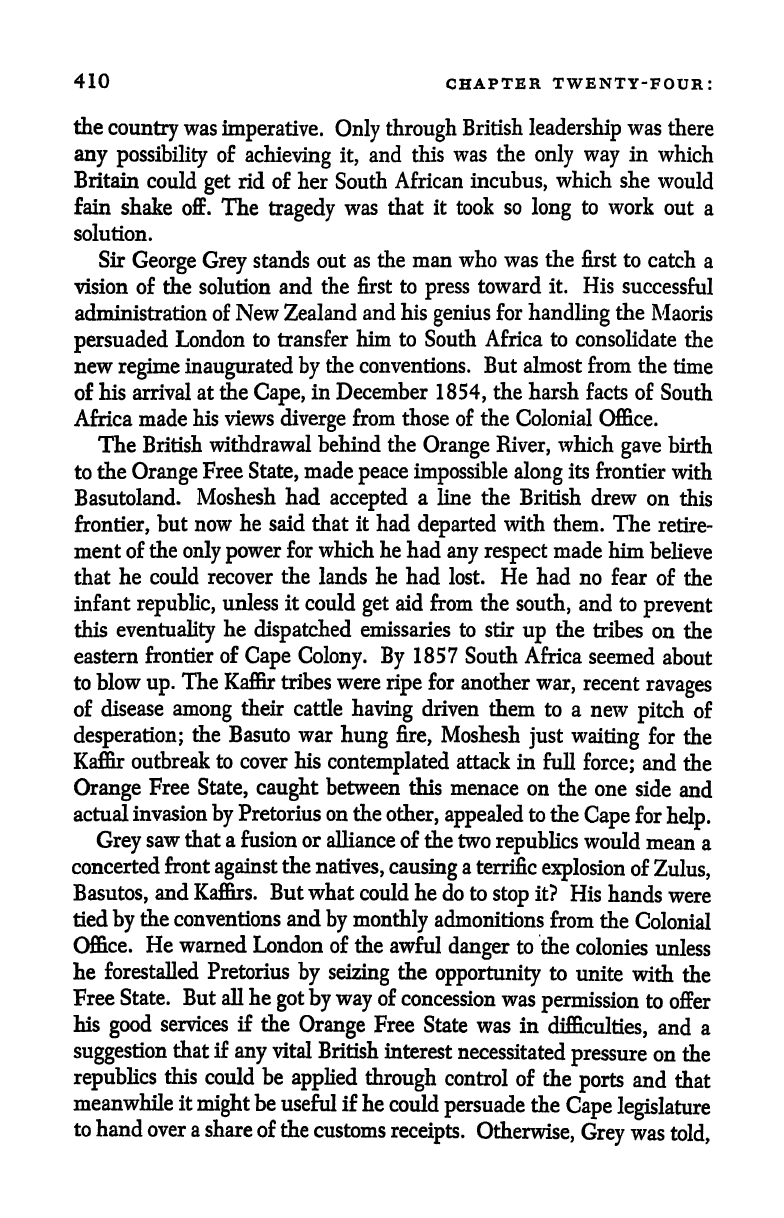
410
CHAPTER
TWENTY-FOUR:
the
country
was
imperative.
Only through
British
leadership
was
there
any
possibility
of
achieving
it,
and this
was
the
only way
in
which
Britain
could
get
rid
of her South
African
incubus,
which
she
would
fain
shake off. The
tragedy
was
that
it
took
so
long
to work
out
a
solution.
Sir
George Grey
stands
out
as
the man
who was
the
first
to
catch
a
vision of the
solution
and
the first
to
press
toward
it. His
successful
administration of New Zealand
and his
genius
for
handling
the
Maoris
persuaded
London
to
transfer
him to
South
Africa to
consolidate
the
new
regime
inaugurated
by
the conventions. But
almost from
the
time
of
his arrival
at the
Cape,
in December
1854,
the harsh facts
of
South
Africa made
his
views
diverge
from those
of the Colonial
Office.
The British
withdrawal
behind the
Orange
River,
which
gave
birth
to
the
Orange
Free
State,
made
peace impossible
along
its
frontier
with
Basutoland.
Moshesh had
accepted
a line the British drew
on
this
frontier,
but
now
he
said
that it
had
departed
with them.
The
retire-
ment of
the
only power
for
which he had
any respect
made
him
believe
that
he could
recover the
lands he
had
lost.
He
had
no
fear
of
the
infant
republic,
unless
it
could
get
aid from the
south,
and to
prevent
this
eventuality
he
dispatched
emissaries
to stir
up
the
tribes
on
the
eastern
frontier
of
Cape Colony. By
1857
South
Africa
seemed
about
to
blow
up.
The Kaffir
tribes
were
ripe
for
another
war,
recent
ravages
of
disease
among
their cattle
having
driven them
to
a new
pitch
of
desperation;
the Basuto war
hung
fire,
Moshesh
just
waiting
for
the
Kaffir outbreak
to cover his
contemplated
attack in
full
force;
and
the
Orange
Free
State,
caught
between
this
menace
on
the
one
side
and
actual
invasion
by
Pretorius on the
other,
appealed
to
the
Cape
for
help.
Grey
saw
that a
fusion or
alliance
of
the two
republics
would
mean
a
concerted
front
against
the
natives,
causing
a
terrific
explosion
of
Zulus,
Basutos,
and Kaffirs.
But
what
could he do
to
stop
it?
His
hands
were
tied
by
the
conventions and
by
monthly
admonitions
from
the
Colonial
Office.
He warned London
of the
awful
danger
to the
colonies
unless
he
forestalled
Pretorius
by
seizing
the
opportunity
to
unite
with
the
Free
State. But all he
got by way
of
concession was
permission
to offer
his
good
services
if
the
Orange
Free
State
was in
difficulties,
and
a
suggestion
that
if
any
vital British
interest
necessitated
pressure
on
the
republics
this
could be
applied
through
control of
the
ports
and
that
meanwhile it
might
be
useful if
he
could
persuade
the
Cape
legislature
to hand over
a
share
of the
customs
receipts.
Otherwise,
Grey
was
told,
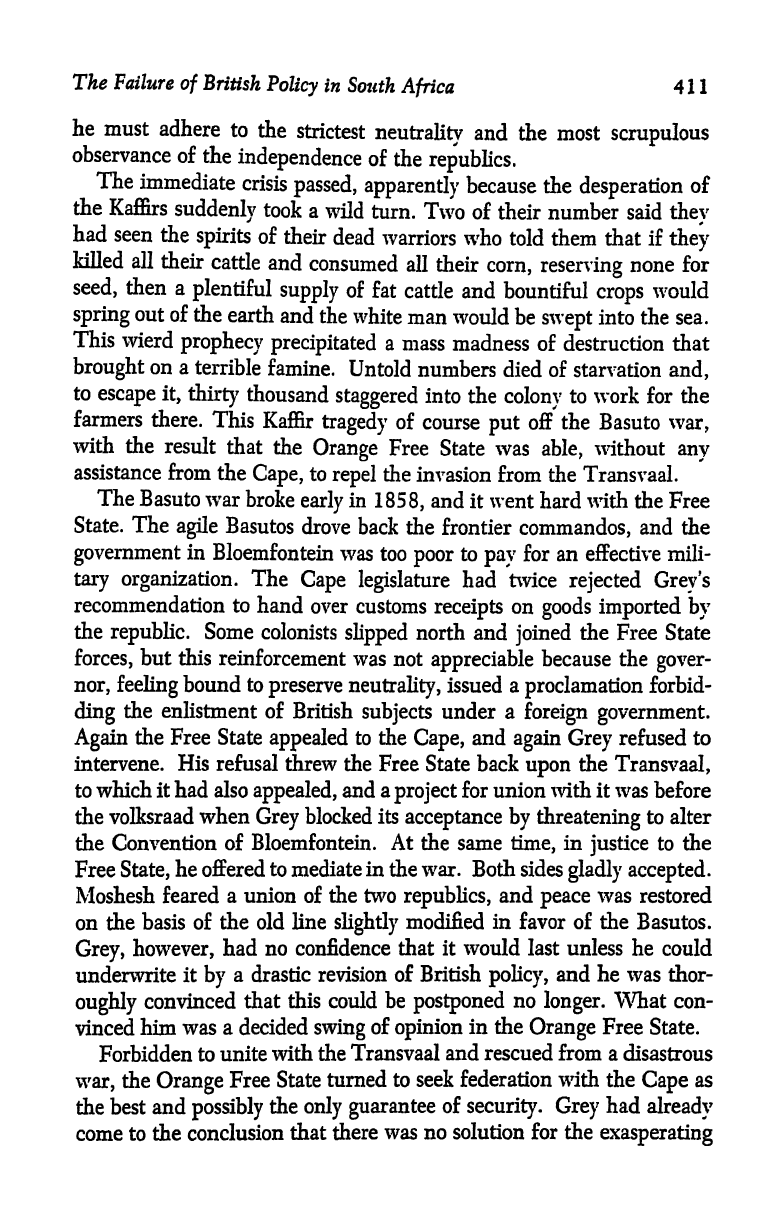
The Failure
of
British
Policy
in
South
Africa
4 1
1
he must
adhere
to
the
strictest
neutrality
and the most
scrupulous
observance
of
the
independence
of
the
republics.
The
immediate
crisis
passed,
apparently
because the
desperation
of
the
Kaffirs
suddenly
took
a
wild
turn.
Two of
their
number said
they
had
seen
the
spirits
of
their
dead
warriors who
told them
that if
they
killed
all
their
cattle
and
consumed
all
their
corn,
reserving
none
for
seed,
then
a
plentiful
supply
of
fat
cattle and
bountiful
crops
would
spring
out of
the
earth
and
the
white
man
would be
swept
into
the sea.
This
wierd
prophecy
precipitated
a
mass
madness of destruction that
brought
on a
terrible
famine.
Untold
numbers
died
of
starvation
and,
to
escape
it,
thirty
thousand
staggered
into the
colony
to work for the
farmers
there.
This
Kaffir
tragedy
of
course
put
off' the Basuto
war,
with the
result
that
the
Orange
Free
State was
able,
without
any
assistance
from
the
Cape,
to
repel
the
invasion from the Transvaal.
The
Basuto
war
broke
early
in
1858,
and it
went
hard with the
Free
State. The
agile
Basutos
drove
back the
frontier
commandos,
and
the
government
in
Bloemfontein
was
too
poor
to
pay
for an effective mili-
tary organization.
The
Cape legislature
had
twice
rejected Grey's
recommendation to
hand
over customs
receipts
on
goods
imported by
the
republic.
Some
colonists
slipped
north and
joined
the
Free State
forces,
but this
reinforcement was
not
appreciable
because the
gover-
nor,
feeling
bound to
preserve
neutrality,
issued
a
proclamation
forbid-
ding
the
enlistment
of British
subjects
under a
foreign government.
Again
the
Free State
appealed
to
the
Cape,
and
again
Grey
refused
to
intervene.
His
refusal threw the Free
State back
upon
the
Transvaal,
to
which it had
also
appealed,
and
a
project
for union
with it
was
before
the volksraad
when
Grey
blocked
its
acceptance by
threatening
to
alter
the Convention
of Bloemfontein.
At
the
same
time,
in
justice
to
the
Free
State,
he offered to mediate
in the war. Both
sides
gladly
accepted.
Moshesh
feared
a union
of
the
two
republics,
and
peace
was
restored
on the
basis of
the
old line
slightly
modified
in favor of the
Basutos.
Grey,
however,
had
no
confidence
that it would last unless
he
could
underwrite
it
by
a
drastic
revision of British
policy,
and he was
thor-
oughly
convinced
that
this
could
be
postponed
no
longer.
What
con-
vinced
him
was
a
decided
swing
of
opinion
in the
Orange
Free State.
Forbidden
to
unite
with the
Transvaal and rescued from a
disastrous
war,
the
Orange
Free State
turned
to
seek federation with the
Cape
as
the best
and
possibly
the
only
guarantee
of
security.
Grey
had
already
come
to
the conclusion
that
there
was
no
solution
for the
exasperating
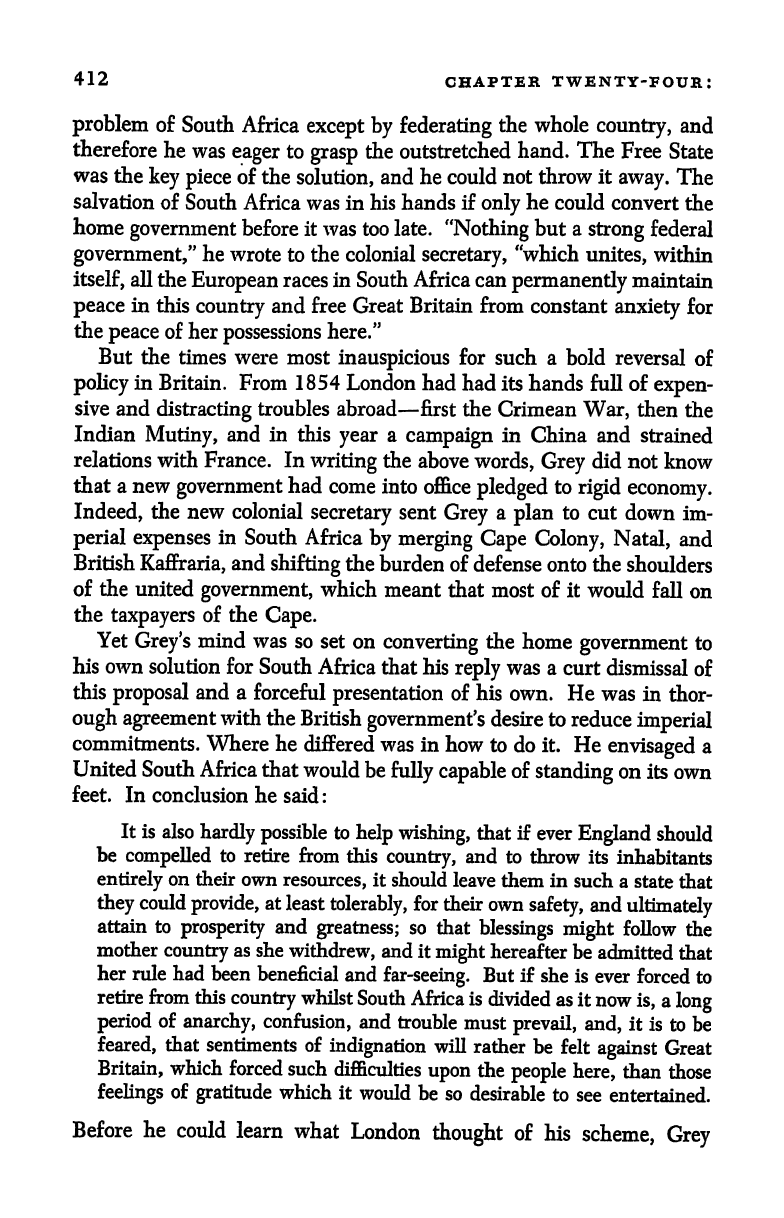
412
CHAPTER
TWENTY-FOUR:
problem
of South
Africa
except
by federating
the
whole
country,
and
therefore
he
was
eager
to
grasp
the outstretched
hand.
The
Free
State
was the
key
piece
of
the
solution,
and he
could
not
throw
it
away.
The
salvation
of
South
Africa was in his
hands if
only
he
could
convert
the
home
government
before it
was
too late.
"Nothing
but
a
strong
federal
government,"
he
wrote to the colonial
secretary,
"which
unites,
within
itself,
all the
European
races in South Africa can
permanently
maintain
peace
in
this
country
and
free
Great
Britain
from
constant
anxiety
for
the
peace
of her
possessions
here."
But the
times were most
inauspicious
for such a
bold
reversal
of
policy
in Britain.
From
1854
London
had had
its hands full of
expen-
sive
and
distracting
troubles abroad
first
the
Crimean
War,
then
the
Indian
Mutiny,
and
in
this
year
a
campaign
in
China
and
strained
relations with France. In
writing
the
above
words,
Grey
did not
know
that
a
new
government
had
come into
office
pledged
to
rigid
economy.
Indeed,
the new
colonial
secretary
sent
Grey
a
plan
to
cut
down
im-
perial
expenses
in
South
Africa
by
merging
Cape
Colony,
Natal,
and
British
Kaffraria,
and
shifting
the
burden of defense
onto
the
shoulders
of the united
government,
which meant
that
most of
it
would
fall
on
the
taxpayers
of
the
Cape.
Yet
Grey's
mind was
so
set
on
converting
the
home
government
to
his own
solution for
South
Africa that
his
reply
was
a
curt
dismissal
of
this
proposal
and a
forceful
presentation
of
his own. He
was
in
thor-
ough agreement
with
the
British
government's
desire
to
reduce
imperial
commitments.
Where
he
differed was
in how
to do
it.
He
envisaged
a
United South
Africa
that
would
be
fully
capable
of
standing
on
its
own
feet.
In
conclusion he
said:
It
is
also
hardly possible
to
help
wishing,
that if ever
England
should
be
compelled
to
retire from
this
country,
and to
throw its
inhabitants
entirely
on
their own
resources,
it should
leave
them
in
such
a
state
that
they
could
provide,
at
least
tolerably,
for
their
own
safety,
and
ultimately
attain
to
prosperity
and
greatness;
so that
blessings
might
follow
the
mother
country
as she
withdrew,
and
it
might
hereafter be
admitted that
her rule
had been
beneficial
and
far-seeing.
But if
she is
ever
forced to
retire from this
country
whilst
South
Africa
is
divided
as
it
now
is,
a
long
period
of
anarchy,
confusion,
and
trouble
must
prevail,
and,
it
is
to be
feared,
that
sentiments of
indignation
will
rather
be
felt
against
Great
Britain,
which
forced
such
difficulties
upon
the
people
here,
than
those
feelings
of
gratitude
which
it
would
be so
desirable to
see
entertained.
Before he
could
learn
what
London
thought
of
his
scheme,
Grey
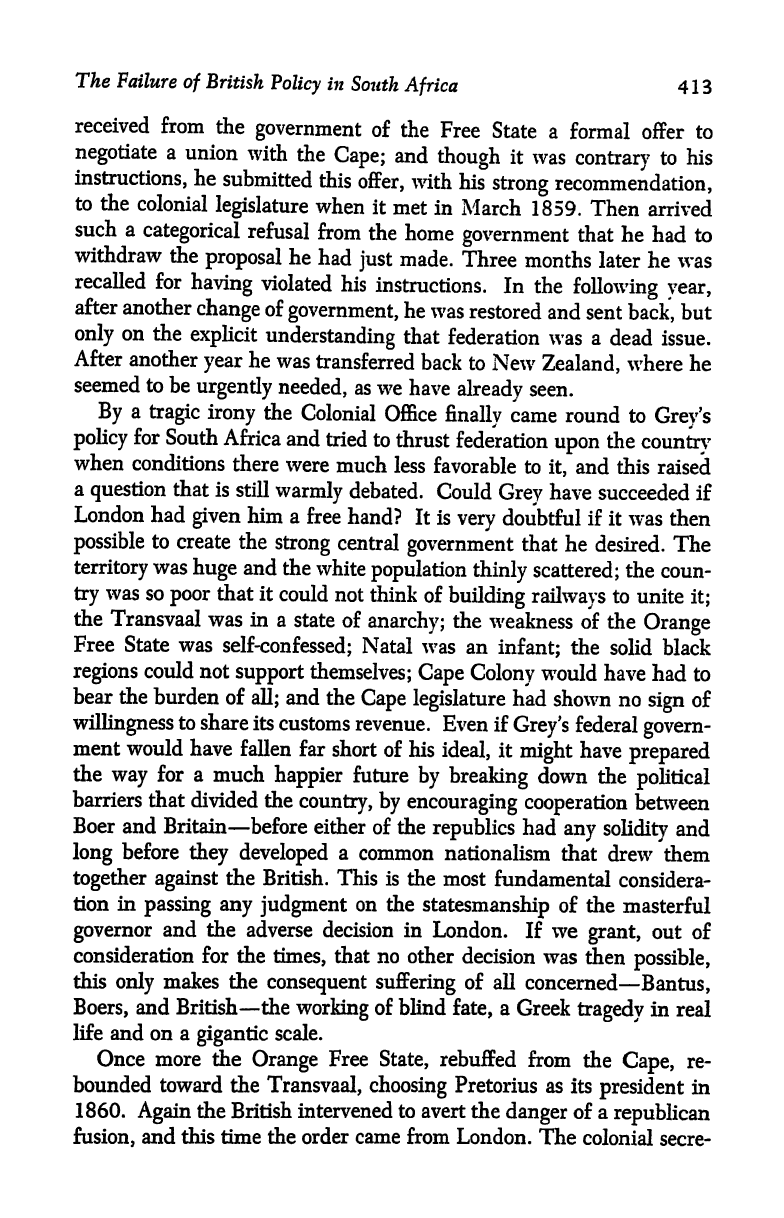
The
Failure
of
British
Policy
in
South
Africa
413
received
from
the
government
of
the
Free
State
a
formal offer
to
negotiate
a
union
with
the
Cape;
and
though
it was
contrary
to his
instructions,
he
submitted
this
offer,
with
his
strong
recommendation,
to the
colonial
legislature
when
it
met in
March
1859.
Then
arrived
such
a
categorical
refusal
from
the
home
government
that he
had to
withdraw
the
proposal
he
had
just
made.
Three
months
later he
was
recalled
for
having
violated
his
instructions.
In
the
following year,
after
another
change
of
government,
he
was
restored and
sent
back,
but
only
on
the
explicit
understanding
that
federation
was
a
dead
issue.
After
another
year
he
was
transferred
back
to
New
Zealand,
where he
seemed
to
be
urgently
needed,
as
we
have
already
seen.
By
a
tragic
irony
the
Colonial
Office
finally
came
round to
Grey's
policy
for
South
Africa
and
tried
to
thrust
federation
upon
the
country
when
conditions
there
were
much
less
favorable
to
it,
and
this
raised
a
question
that is
still
warmly
debated.
Could
Grey
have
succeeded if
London had
given
him a
free
hand? It
is
very
doubtful if it
was
then
possible
to
create
the
strong
central
government
that
he
desired. The
territory
was
huge
and
the
white
population
thinly
scattered;
the
coun-
try
was so
poor
that
it
could
not think
of
building
railways
to
unite
it;
the
Transvaal
was
in
a
state
of
anarchy;
the
weakness of the
Orange
Free State
was
self-confessed;
Natal
was an
infant;
the
solid
black
regions
could not
support
themselves;
Cape
Colony
would have
had to
bear the
burden
of
all;
and
the
Cape
legislature
had
shown
no
sign
of
willingness
to
share
its
customs revenue.
Even
if
Grey's
federal
govern-
ment
would have
fallen far
short of
his
ideal,
it
might
have
prepared
the
way
for a
much
happier
future
by
breaking
down
the
political
barriers that
divided the
country, by
encouraging
cooperation
between
Boer
and Britain
before
either
of the
republics
had
any
solidity
and
long
before
they
developed
a
common
nationalism
that
drew
them
together
against
the
British.
This is
the
most
fundamental
considera-
tion
in
passing any
judgment
on the
statesmanship
of the
masterful
governor
and the adverse
decision in
London.
If we
grant,
out of
consideration
for the
times,
that no other
decision
was
then
possible,
this
only
makes the
consequent
suffering
of
all
concerned
Bantus,
Boers,
and British
the
working
of blind
fate,
a
Greek
tragedy
in
real
life
and on a
gigantic
scale.
Once
more the
Orange
Free
State,
rebuffed
from
the
Cape,
re-
bounded
toward the
Transvaal,
choosing
Pretorius as
its
president
in
1860.
Again
the British
intervened to avert
the
danger
of
a
republican
fusion,
and this time
the order
came
from
London.
The
colonial
secre-
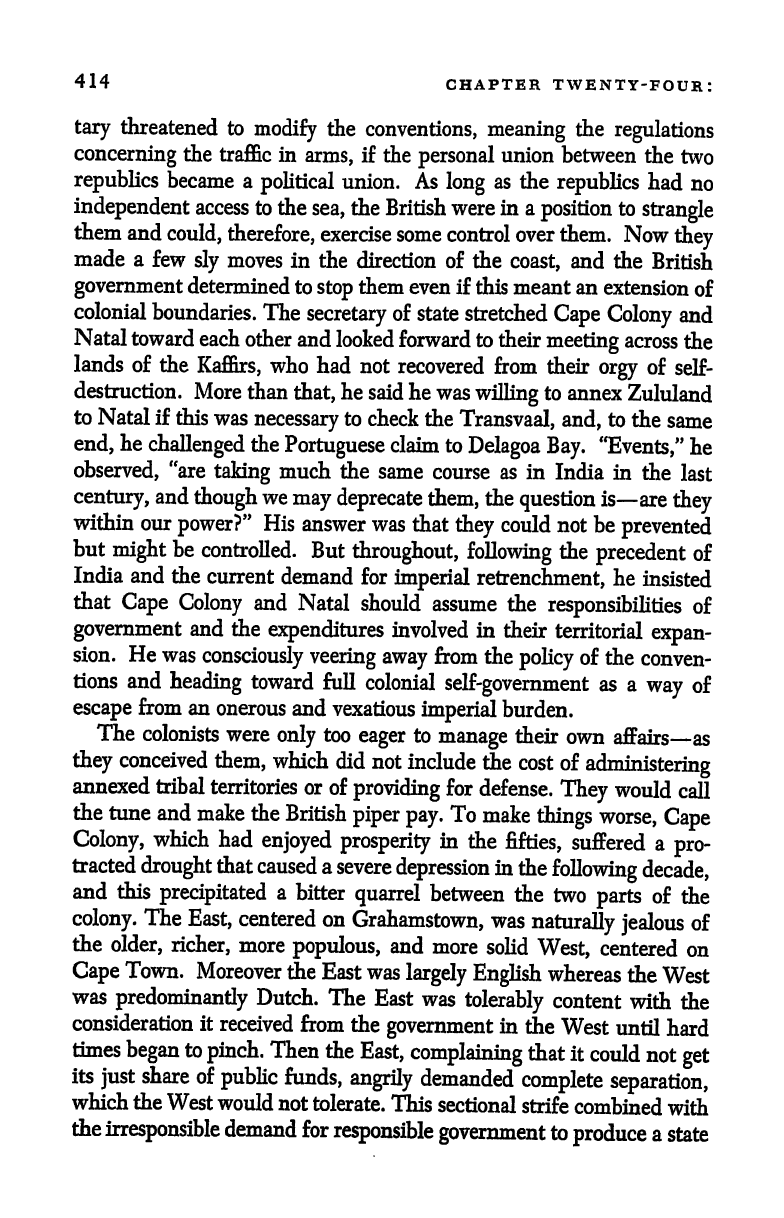
414
CHAPTER
TWENTY-FOUR:
tary
threatened to
modify
the
conventions,
meaning
the
regulations
concerning
the
traffic
in
arms,
if the
personal
union
between
the
two
republics
became
a
political
union.
As
long
as the
republics
had
no
independent
access
to the
sea,
the British were in a
position
to
strangle
them
and
could,
therefore,
exercise
some control over them.
Now
they
made
a
few
sly
moves in the
direction of the
coast,
and
the
British
government
determined
to
stop
them
even if this meant
an
extension
of
colonial
boundaries.
The
secretary
of
state
stretched
Cape
Colony
and
Natal
toward each
other
and
looked forward to their
meeting
across
the
lands of
the
Kaffirs,
who had not
recovered
from their
orgy
of
self-
destruction.
More than
that,
he
said he
was
willing
to
annex
Zululand
to
Natal
if this
was
necessary
to check
the
Transvaal,
and,
to the
same
end,
he
challenged
the
Portuguese
claim
to
Delagoa Bay.
"Events,"
he
observed,
"are
taking
much
the
same
course as
in
India
in
the
last
century,
and
though
we
may
deprecate
them,
the
question
is
are
they
within
our
power?"
His
answer
was that
they
could not be
prevented
but
might
be
controlled.
But
throughout,
following
the
precedent
of
India and
the
current
demand
for
imperial
retrenchment,
he
insisted
that
Cape
Colony
and
Natal
should assume
the
responsibilities
of
government
and the
expenditures
involved in
their
territorial
expan-
sion. He
was
consciously
veering
away
from
the
policy
of
the
conven-
tions and
heading
toward
full
colonial
self-government
as a
way
of
escape
from
an
onerous
and
vexatious
imperial
burden.
The
colonists were
only
too
eager
to
manage
their
own
affairs
as
they
conceived
them,
which
did not
include
the
cost of
administering
annexed
tribal
territories
or
of
providing
for
defense.
They
would
call
the
tune
and make
the
British
piper
pay.
To
make
things
worse,
Cape
Colony,
which
had
enjoyed
prosperity
in
the
fifties,
suffered
a
pro-
tracted
drought
that
caused a
severe
depression
in
the
following
decade,
and this
precipitated
a
bitter
quarrel
between
the
two
parts
of
the
colony.
The
East,
centered on
Grahamstown,
was
naturally
jealous
of
the
older,
richer,
more
populous,
and
more
solid
West,
centered
on
Cape
Town.
Moreover
the
East
was
largely
English
whereas
the
West
was
predominantly
Dutch.
The
East
was
tolerably
content
with
the
consideration it
received
from
the
government
in
the
West
until
hard
times
began
to
pinch.
Then
the
East,
complaining
that
it
could
not
get
its
just
share of
public
funds,
angrily
demanded
complete
separation,
which the
West
would
not
tolerate.
This
sectional
strife
combined with
the
irresponsible
demand for
responsible
government
to
produce
a
state
